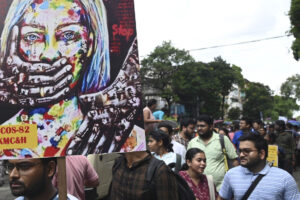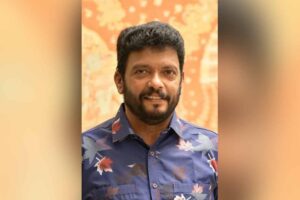Opposition members accused the government of practising “bulldozer” justice and cautioned about the dire consequences of unemployment
Published Date – 06:35 PM, Mon – 18 September 23

New Delhi, Sept 18 (ANI): Proceedings of Rajya Sabha underway on the first day of Special Session of Parliament, in New Delhi on Monday. (ANI Photo/Sansad TV)
New Delhi: Opposition members in Rajya Sabha on Monday hit out at the government, accusing it of indulging in majoritarianism and defying the tenets of parliamentary democracy.
During a discussion in the Upper House on the 75-year journey of Parliament, they also accused the government of practising “bulldozer” justice and cautioned about the dire consequences of unemployment.
Taking part in the discussion, the RJD’s Manoj Kumar Jha quoted the chief architect of the Constitution BR Ambedkar and said democracy also meant “preventing tyranny of the majority”.
There is a need for a majority as governments cannot run without a majority but there is a “difference between majority and majoritarianism”, he added.
“When our government forgets this difference…when we make even a small criticism, which is never personal, we are told to go to Pakistan,” Jha said, adding that if everybody who criticises the government were to go to the neighbouring country, it won’t be able to accommodate all.
Taking part in the discussion, Jose K Mani of the KC(M) said, “It is an undeniable fact (that) recent years have witnessed instances of undemocratic parliamentary methods and procedures, which threatened the very essence of democracy.” “There have been occasions where legislative debates have been curtailed, the opposition’s voice silenced and crucial bills passed without due discussions and scrutiny,” he alleged.
The integrity of Parliament committees, an internal part of the democratic system, has at times been compromised, Mani claimed, adding, “Delays in appointments and politicisation of these committees have hindered their effectiveness. Only 25 per cent of the bills were referred to these committees.”
The Kerala Congress (M) leader further said, “Such a low referral rate of bills to the committee during the 16th Lok Sabha clearly shows the government is not open to scrutiny and engagement that the committee offers.” The suppression of dissent, be it from the civil society, academia or the media, is a matter of deep concern, he added.
Tiruchi Siva of the DMK claimed that the space for the opposition is shrinking. “There has been a decline in the ability of Parliament to hold the government accountable… The government resorts to ordinances rather than legislation,” he said.
Replying to this, Raya Sabha Chairman Jagdeep Dhankhar said, “You are right but when I look within, I find lost opportunities. Enough opportunities were available. Why was that not availed? We have to be very rational and committed.”
Amar Patnaik of the BJD said states have a very important role to play in parliamentary democracy and there have been problems in financial relations over the devolution of funds.
“I think cess and surcharge which falls in the central kitty should be made in the divisible pool to make the state financially independent and sustainable,” he added.
S Niranjan Reddy of the YSRCP said as Parliament is moving to a new building, there is concern among south Indian states.
“South Indian states, the more developed Indian states, are feeling that will they be outnumbered because Article 82 gives protection until 2026. Would that be balanced in some manner? We will debate it,” he said.
Article 82 deals with the number of seats allotted to the House of People.
John Brittas of the CPI(M) said that according to Ambedkar, democracy is not the law of the majority but the protection of the minority. He alleged that the current government was flouting the tenets of parliamentary democracy of the accountability of the executive to the legislator.
“Have you ever seen the accountability of the executive to the legislature? What is the presence of the prime minister in Parliament? 0.001 per cent! That is the period in which he attended the Parliament session,” Brittas claimed.
On the justice front, he said, “You will notice that we have reached the ‘bulldozer era’. The justice that is being imparted is bulldozer era.” MDMK’s Vaiko claimed the formation of the opposition INDIA alliance proved to be a threat to the government, forcing it to use ‘Bharat’ as the country plaque at the G20 Summit.
He alleged that the government was trying to turn this country into a ‘Hindu Rashtra’ and warned that it would have serious consequences as minorities such as Muslims are under threat.
“In this way, the country will be balkanised… It will become (another) Soviet Union. What happened to the Soviet Union will happen in India. India will be balkanised into so many states,” Vaiko said.
Drawing attention to rising unemployment, the RJD’s Jha said as India’s population continues to rise, there is a need to tackle the challenge.
“One party or the other may be in government but unemployment will finish our politics. What are we doing about the right to employment,” he asked.
The NCP’s Praful Patel, BJP’s Bhubaneswar Kalita, AGP’s Birendra Prasad Baishya, TMC’s Md Nadimul Haque, Congress’ Shaktisinh Gohil and Rajiv Shukla, AIADMK’s M Thambidurai, BRS’ K Keshava Rao, AAP’s Vikramjit Singh Sahney, BJD’s Mamata Mohanta and GK Vasan of the TMC(M) also took part in the discussion.




